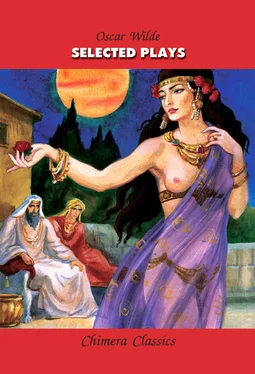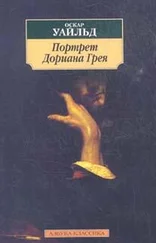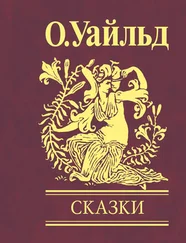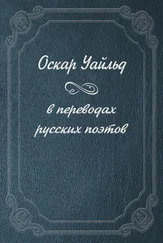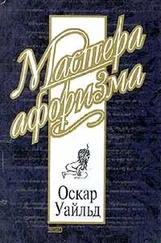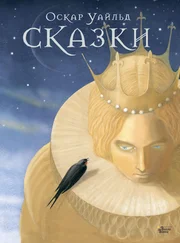LADY BRACKNELL. I am afraid that the news I have to give you will not altogether please you. You are the son of my poor sister, Mrs. Moncrieff, and consequently Algernon’s elder brother.
JACK. Algy’s elder brother! Then I have a brother after all. I knew I had a brother! I always said I had a brother! Cecily, – how could you have ever doubted that I had a brother? (Seizes hold of ALGERNON.) Dr. Chasuble, my unfortunate brother. Miss Prism, my unfortunate brother. Gwendolen, my unfortunate brother. Algy, you young scoundrel, you will have to treat me with more respect in the future. You have never behaved to me like a brother in all your life.
ALGERNON. Well, not till today, old boy, I admit. I did my best, however, though I was out of practice.
(Shakes hands.)
GWENDOLEN. (To JACK.) My own! But what own are you? What is your Christian name, now that you have become someone else?
JACK. Good heavens!… I had quite forgotten that point. Your decision on the subject of my name is irrevocable, I suppose?
GWENDOLEN. I never change, except in my affections.
CECILY. What a noble nature you have, Gwendolen!
JACK. Then the question had better be cleared up at once. Aunt Augusta, a moment. At the time when Miss Prism left me in the handbag, had I been christened already?
LADY BRACKNELL. Every luxury that money could buy, including christening, had been lavished on you by your fond and doting parents.
JACK. Then I was christened! That is settled. Now, what name was I given? Let me know the worst.
LADY BRACKNELL. Being the eldest son you were naturally christened after your father.
JACK. (Irritably.) Yes, but what was my father’s Christian name?
LADY BRACKNELL. (Meditatively.) I cannot at the present moment recall what the General’s Christian name was. But I have no doubt he had one. He was eccentric, I admit. But only in later years. And that was the result of the Indian climate, and marriage, and indigestion, and other things of that kind.
JACK. Algy! Can’t you recollect what our father’s Christian name was?
ALGERNON. My dear boy, we were never even on speaking terms. He died before I was a year old.
JACK. His name would appear in the Army Lists of the period, I suppose, Aunt Augusta?
LADY BRACKNELL. The General was essentially a man of peace, except in his domestic life. But I have no doubt his name would appear in any military directory.
JACK. The Army Lists of the last forty years are here. These delightful records should have been my constant study. (Rushes to bookcase and tears the books out.) M. Generals… Mallam, Maxbohm, Magley, what ghastly names they have – Markby, Migsby, Mobbs, Moncrieff! Lieutenant 1840, Captain, Lieutenant-Colonel, Colonel, General 1869, Christian names, Ernest John. (Puts book very quietly down and speaks quite calmly.) I always told you, Gwendolen, my name was Ernest, didn’t I? Well, it is Ernest after all. I mean it naturally is Ernest.
LADY BRACKNELL. Yes, I remember now that the General was called Ernest. I knew I had some particular reason for disliking the name.
GWENDOLEN. Ernest! My own Ernest! I felt from the first that you could have no other name!
JACK. Gwendolen, it is a terrible thing for a man to find out suddenly that all his life he has been speaking nothing but the truth. Can you forgive me?
GWENDOLEN. I can. For I feel that you are sure to change.
JACK. My own one!
CHASUBLE. (To MISS PRISM.) Lætitia! (Embraces her)
MISS PRISM. (Enthusiastically.) Frederick! At last!
ALGERNON. Cecily! (Embraces her.) At last!
JACK. Gwendolen! (Embraces her.) At last!
LADY BRACKNELL. My nephew, you seem to be displaying signs of triviality.
JACK. On the contrary, Aunt Augusta, I’ve now realised for the first time in my life the vital Importance of Being Earnest.
Curtain
The Persons of the Play
Herod Antipas, Tetrarch of Judæa
Jokanaan, the Prophet
The Young Syrian, Captain of the Guard
Tigellinus, a Young Roman
A Cappadocian
A Nubian
First Soldier
Second Soldier
The Page of Herodias
Jews, Nazarenes, etc.
A Slave
Naaman, the Executioner
Herodias, Wife of the Tetrarch
Salomé, Daughter of Herodias
The Slaves of Salomé
* * *
Scene. A great terrace in the Palace of HEROD, set above the banqueting-hall. Some soldiers are leaning over the balcony. To the right there is a gigantic staircase, to the left, at the back, an old cistern surrounded by a wall of green bronze. The moon is shining very brightly.
THE YOUNG SYRIAN. How beautiful is the Princess Salomé tonight!
THE PAGE OF HERODIAS. Look at the moon. How strange the moon seems! She is like a woman rising from a tomb. She is like a dead woman. One might fancy she was looking for dead things.
THE YOUNG SYRIAN. She has a strange look. She is like a little princess who wears a yellow veil, and whose feet are of silver. She is like a princess who has little white doves for feet. One might fancy she was dancing.
THE PAGE OF HERODIAS. She is like a woman who is dead. She moves very slowly. (Noise in the banqueting-hall.)
FIRST SOLDIER. What an uproar! Who are those wild beasts howling?
SECOND SOLDIER. The Jews. They are always like that. They are disputing about their religion.
FIRST SOLDIER. Why do they dispute about their religion?
SECOND SOLDIER. I cannot tell. They are always doing it. The Pharisees, for instance, say that there are angels, and the Sadducees declare that angels do not exist.
FIRST SOLDIER. I think it is ridiculous to dispute about such things.
THE YOUNG SYRIAN. How beautiful is the Princess Salomé tonight!
THE PAGE OF HERODIAS. You are always looking at her. You look at her too much. It is dangerous to look at people in such fashion. Something terrible may happen.
THE YOUNG SYRIAN. She is very beautiful tonight.
FIRST SOLDIER. The Tetrarch has a sombre aspect.
SECOND SOLDIER. Yes; he has a sombre aspect.
FIRST SOLDIER. He is looking at something.
SECOND SOLDIER. He is looking at someone.
FIRST SOLDIER. At whom is he looking?
SECOND SOLDIER. I cannot tell.
THE YOUNG SYRIAN. How pale the Princess is! Never have I seen her so pale. She is like the shadow of a white rose in a mirror of silver.
THE PAGE OF HERODIAS. You must not look at her. You look too much at her.
FIRST SOLDIER. Herodias has filled the cup of the Tetrarch.
THE CAPPADOCIAN. Is that the Queen Herodias, she who wears a black mitre sewed with pearls, and whose hair is powdered with blue dust?
FIRST SOLDIER. Yes; that is Herodias, the Tetrarch’s wife.
SECOND SOLDIER. The Tetrarch is very fond of wine. He has wine of three sorts. One which is brought from the Island of Samothrace, and is purple like the cloak of Cæsar.
THE CAPPADOCIAN. I have never seen Cæsar.
SECOND SOLDIER. Another that comes from a town called Cyprus, and is as yellow as gold.
THE CAPPADOCIAN. I love gold.
SECOND SOLDIER. And the third is a wine of Sicily. That wine is as red as blood.
THE NUBIAN. The gods of my country are very fond. Twice in the year we sacrifice to them young men and maidens; fifty young men and a hundred maidens. But I am afraid that we never give them quite enough, for they are very harsh to us.
THE CAPPADOCIAN. In my country there are no gods left. The Romans have driven them out. There are some who say that they have hidden themselves in the mountains, but I do not believe it. Three nights I have been on the mountains seeking them everywhere. I did not find them. And at last I called them by their names, and they did not come. I think they are dead.
Читать дальше
Конец ознакомительного отрывка
Купить книгу
